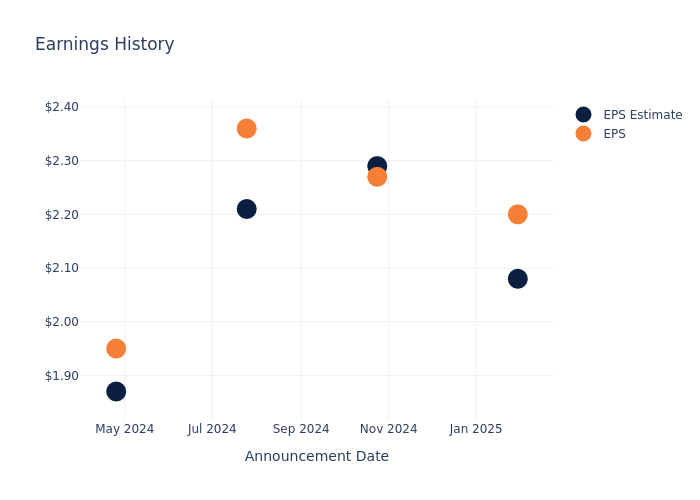
Dover (NYSE:DOV) is set to give its latest quarterly earnings report on Thursday, 2025-04-24. Here's what investors need to know before the announcement.
Analysts estimate that Dover will report an earnings per share (EPS) of $1.99.
Dover bulls will hope to hear the company announce they've not only beaten that estimate, but also to provide positive guidance, or forecasted growth, for the next quarter.
New investors should note that it is sometimes not an earnings beat or miss that most affects the price of a stock, but the guidance (or forecast).
Earnings Track Record
In the previous earnings release, the company beat EPS by $0.12, leading to a 0.85% drop in the share price the following trading session.
Here's a look at Dover's past performance and the resulting price change:
| Quarter | Q4 2024 | Q3 2024 | Q2 2024 | Q1 2024 |
|---|---|---|---|---|
| EPS Estimate | 2.08 | 2.29 | 2.21 | 1.87 |
| EPS Actual | 2.20 | 2.27 | 2.36 | 1.95 |
| Price Change % | -1.0% | 1.0% | -1.0% | 1.0% |

Performance of Dover Shares
Shares of Dover were trading at $163.56 as of April 22. Over the last 52-week period, shares are down 6.35%. Given that these returns are generally negative, long-term shareholders are likely unhappy going into this earnings release.
Analysts' Take on Dover
Understanding market sentiments and expectations within the industry is crucial for investors. This analysis delves into the latest insights on Dover.
A total of 11 analyst ratings have been received for Dover, with the consensus rating being Neutral. The average one-year price target stands at $206.18, suggesting a potential 26.06% upside.
Analyzing Ratings Among Peers
The analysis below examines the analyst ratings and average 1-year price targets of Fortive, Xylem and Ingersoll Rand, three significant industry players, providing valuable insights into their relative performance expectations and market positioning.
- Analysts currently favor an Neutral trajectory for Fortive, with an average 1-year price target of $79.67, suggesting a potential 51.29% downside.
- Analysts currently favor an Buy trajectory for Xylem, with an average 1-year price target of $143.0, suggesting a potential 12.57% downside.
- Analysts currently favor an Outperform trajectory for Ingersoll Rand, with an average 1-year price target of $93.7, suggesting a potential 42.71% downside.
Peer Metrics Summary
The peer analysis summary provides a snapshot of key metrics for Fortive, Xylem and Ingersoll Rand, illuminating their respective standings within the industry. These metrics offer valuable insights into their market positions and comparative performance.
| Company | Consensus | Revenue Growth | Gross Profit | Return on Equity |
|---|---|---|---|---|
| Dover | Neutral | 1.32% | $745.72M | 22.70% |
| Fortive | Neutral | 2.31% | $977.20M | 2.01% |
| Xylem | Buy | 6.52% | $857M | 3.07% |
| Ingersoll Rand | Outperform | 4.24% | $815.40M | 2.25% |
Key Takeaway:
Dover ranks in the middle among its peers for revenue growth, with one company showing the highest growth. Dover's gross profit is the second highest, with one company leading. Dover's return on equity is the highest among its peers, with one company having the lowest. Overall, Dover is positioned well compared to its peers in terms of financial performance metrics.
All You Need to Know About Dover
Founded in 1955 by George Ohrstrom, Dover has become an industrial behemoth through the acquisition of dozens of esteemed brands. The company is organized into five segments through which it designs and manufactures highly engineered components, such as vehicle repair, factory automation, welding, aerospace, fuel dispensing, printing, liquid handling, refrigeration, and can-making equipment. It has operations around the globe but generates over half of its revenue in the United States.
A Deep Dive into Dover's Financials
Market Capitalization Analysis: Above industry benchmarks, the company's market capitalization emphasizes a noteworthy size, indicative of a strong market presence.
Revenue Growth: Dover displayed positive results in 3 months. As of 31 December, 2024, the company achieved a solid revenue growth rate of approximately 1.32%. This indicates a notable increase in the company's top-line earnings. When compared to others in the Industrials sector, the company faces challenges, achieving a growth rate lower than the average among peers.
Net Margin: Dover's net margin is impressive, surpassing industry averages. With a net margin of 74.41%, the company demonstrates strong profitability and effective cost management.
Return on Equity (ROE): Dover's ROE excels beyond industry benchmarks, reaching 22.7%. This signifies robust financial management and efficient use of shareholder equity capital.
Return on Assets (ROA): Dover's ROA surpasses industry standards, highlighting the company's exceptional financial performance. With an impressive 11.76% ROA, the company effectively utilizes its assets for optimal returns.
Debt Management: Dover's debt-to-equity ratio is below the industry average at 0.45, reflecting a lower dependency on debt financing and a more conservative financial approach.
To track all earnings releases for Dover visit their earnings calendar on our site.
This article was generated by Benzinga's automated content engine and reviewed by an editor.